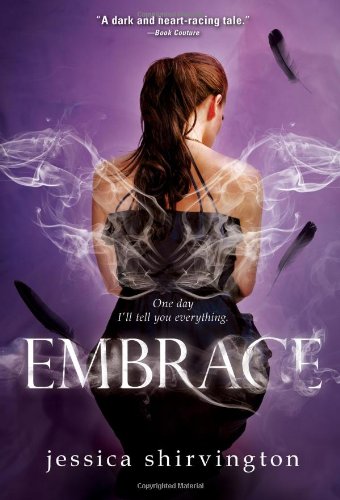Embrace: the perfect read for an aspiring critic
January 31, 2022
The Embrace series by Jessica Shirvington is by far one of the worst pieces of literature I have ever stumbled upon. I was drawn in by the intriguing cover with smokey angel wings and odd but enticing fashion choices, and left with disappointment and a seething hatred for almost every character depicted.
I read this book for the first time in eighth grade, and finished the entire series in roughly a month. The horrors within stood out to me so long that now, in my junior year of high school, I can still recall almost every flaw with perfect accuracy. Even if I’m not accurate, you’ll never know, because you should never lay your untainted eyes upon this menace of a book. If you do choose to read it, beware that I will be mildly spoiling some beginning conflict and vaguely referencing later events, but not enough to ruin the plotline.
To start on a positive note, the worldbuilding within the series is absolutely stellar, and is the only reason I kept reading past the first installment. In summary, children who lose a parent within the first few months or so of their life are given a small piece of angelic power, as this loss allows for angelic interference with the mortal world. These children become Grigori, and their abilities depend on which type of angel in the hierarchy marked them. They are then tasked with keeping a sacred balance between angels, fallen angels, and humans, using these powers to hunt all angelic sources to maintain this equilibrium.
Flaws begin to appear when we take into account the main characters. Violet Eden (yes, that is her last name) is about to turn 17-years-old, which also happens to be the same day her mother died. She blends teenage angst and dry snark quite well at first, but quickly becomes intolerable due to a lack of critical thinking skills and far too many hormones to be healthy. A great example of this is in her first conflict with the main love interest, Lincoln. Lincoln is a Grigori in his twenties (yikes), who Violet is unbearably in love with (even bigger yikes), who is assigned to Violet as her main guide and protector as she begins to understand her abilities and heritage. Although he knows of her Grigori status long before the story begins, and was friends with her at the same time, he was forbidden to tell her before the correct time without facing extreme consequences from Grigori leaders. Despite being told this information, Violet throws a fit when she discovers that Lincoln was keeping the secret from her and finds the worst possible rebound to fall in love with despite every single red flag fluttering in the wind. Her rebound becomes plot relevant a bit later, but that foreshadowing is about as subtle as a train horn.
The other characters vary from incredibly overpowered, to weak, forgettable, and rarely mentioned. Violet herself falls into that dreaded “Mary Sue” archetype, and surprisingly her best friend Stephanie is equally bland. While Violet’s angelic powers surpass “main character energy” into the bounds of ridiculousness, Stephanie manages to be attractive, rich, extremely intelligent, and charismatic, with few flaws becoming relevant, ever. She acts as a metaphorical Swiss Army knife to every problem Violet throws at her feet while simultaneously being perfect in every way. In terms of minor and supporting characters, I found them far more compelling and enjoyable despite their drastically lower presence. Despite this, I cannot remember a single one of their names, which goes to show how little of an effect this book had on me other than inspiring a passionate hatred.
In conclusion, this would be an excellent book to steal worldbuilding inspiration from, and an excellent read if you hate yourself. I plead, however, that if you read through the full series: do not let yourself be fooled. Every character is obnoxious, and if they’re not obnoxious, don’t get attached, their plot relevance is shaky at best and they might just be there to make the main characters look somehow more bland.



